Wilmington, Delaware seems a strange origin for an American mountain bike legend. There are no mountains to speak of in the country's first state, and while there's a developing and passionate community of riders throughout Newcastle County nowadays, that certainly wasn't the case while Sue Haywood was growing up. Sue's life story might begin here, but her mountain bike legend didn't sprout until a bit later in life, during her freshman year at West Virginia University. The mountains of West Virginia are among the oldest on our planet, and it was deep within those dark forests where Sue would discover an enormous passion for riding bikes in the woods.
Sue's career has gone through a great deal of change in the nearly 20 years she's been riding bikes professionally. What began auspiciously during a race in which she was 1/2 of the women's beginner field, eventually grew into a successful career racing World Cup XC for many years. While racing certainly brought joy and triumph to her life, it also was a source of pain and frustration, most notably during the 2004 USAC Olympic debacle during which she was famously left off of the roster. Sue managed to respond to that adversity well, and saw success for several years to follow as a World Cup athlete before eventually retiring from that level of competition after the 2008 season. While strong technical skills and power served her well during her career as an elite racer, it's her endless encouragement of others, her passion for personal growth, and a ceaseless love of riding that have given her the adoration of so many people within the mountain bike community.
Her career, like many professional riders, has been loaded with one obstacle after another, but it's the lessons learned that have provided her with an invaluable perspective and worldview; one that has allowed her to share an almost zen-like approach to life and mountain biking with everyone who has the opportunity to spend time with her. Sue Haywood still acknowledges the good that can come from competition and racing, but it's clear that for her, simply riding bikes with your friends can be even better for the soul.
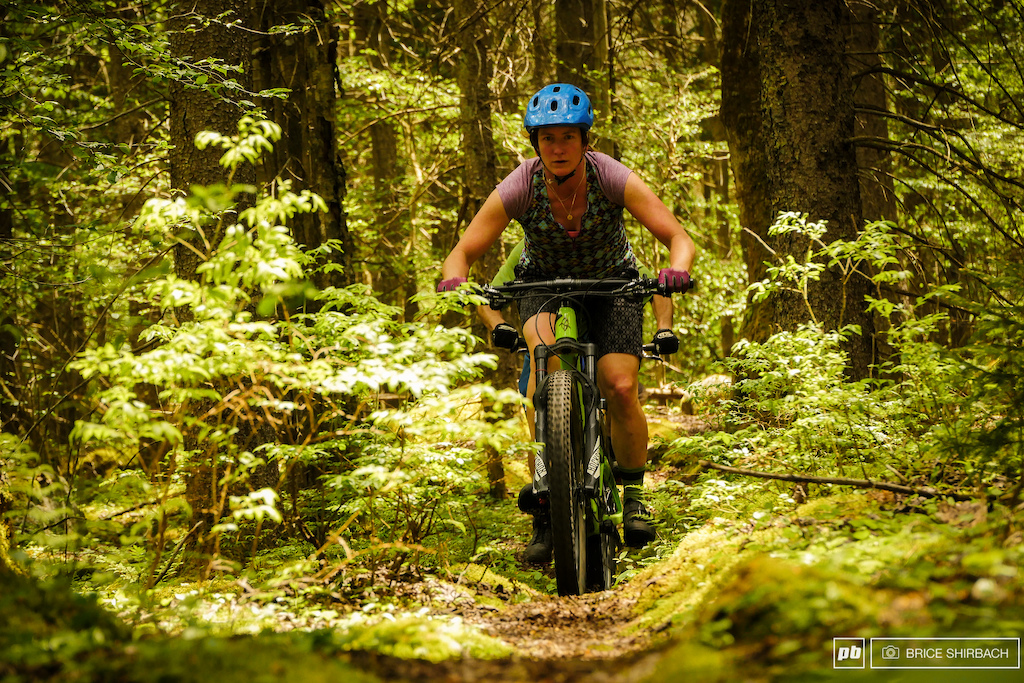
Sue was born and raised in America's first state, but it would be the mountains of West Virginia where she would find home.
 Do you remember your first race?
Do you remember your first race?I remember it perfectly. It was in West Virginia. It was at one of the WVMBA events. I was in the beginner class, and there were only two women in the class, so the promoter actually refused to even recognize us at the end. He said that there had to be three in the class, to make it an actual class. I remember thinking that it didn’t really seem fair. So that was my intro. I loved it from the start because it was hard. I was definitely not doing great things at all, but I was breathing hard, sweating, and just enjoying that intrinsic challenge. So I kept with it, and didn’t get discouraged by the race promoter.
 At what point then did you think you might try and make a career of it?
At what point then did you think you might try and make a career of it?I raced that WVMBA series for a long time. I started out as a beginner, and raced sport for maybe one race before getting bumped up to expert. There just weren’t a lot of women in the expert category at the time. I had some initial success as an expert too, but I was racing that series for a very long time before I thought to look for some higher caliber events. It took a while though. There was a NORBA National at Seven Springs in Pennsylvania in 1997. I went up to that and raced, and won the expert category. That’s what I needed to do in order to bump up to the pro category. You had to write a letter as well and request to be brought up to that level. Honestly, in my own head, I was way better than I was in reality, and that’s only because I had good technical skills. That’s what I thought mountain bike racing was, if you had good technical skills then you were going to do well. That ended up not being the case. I turned pro in 1998, and had to hire a coach in 1999.
 What did having a coach reveal to you?
What did having a coach reveal to you?Well, it’s definitely a fitness-based sport. Skills help out a little bit, but when you’re very tired or off the back, those skills aren’t going to help out very much in the scheme of things. So that was the battle for many, many years. You know, not getting up the hill quickly enough, or being frustrated because I’m off the back. I wanted to go faster on the singletrack sections, but I was stuck in the back and didn’t have the fitness to execute a real race plan.
 When did the World Cup racing start? It didn’t take you very long to get there.
When did the World Cup racing start? It didn’t take you very long to get there.I was on the Trek East Coast factory team for my first three years as a pro. I just started to dabble in a few of the U.S. World Cup stops. In 2001, I won the Short Track National Championship as an East Coast factory rider. The next year, the Trek World factory team picked me up.
 Can you describe what it feels like to go through the process of developing yourself into a fit and fast enough rider to actually be competitive at the highest level of competition?
Can you describe what it feels like to go through the process of developing yourself into a fit and fast enough rider to actually be competitive at the highest level of competition?My coach would send me a training schedule, and it might say “ride for three hours”. Well, basically, I wouldn’t get out on the bike until two or three in the afternoon because I didn’t really understand how to be disciplined with my schedule at that point. To me, it was still like “Oh, I get to ride my bike all day”. I definitely wasn’t very motivated for a couple of years, even though I had the coach. I still just really loved riding. I really loved racing too, but I was not a Type-A person. It took several years for me to find the discipline with the routine. So when I made the bigger team, I had a different coach. He was more experienced and a hard driving dude, and I had to make bigger changes to my lifestyle. I began spending winters in Arizona, because you can’t stay in West Virginia if you want to ride in the winter. I think that the commitment to the routine and lifestyle was the biggest change for me.
 What are some of the key differences you see between World Cup competition today, versus what you experienced only a decade ago?
What are some of the key differences you see between World Cup competition today, versus what you experienced only a decade ago?I would say that everyone’s skills today are so much better than when I was racing. When I was racing, you could win a lot of races without having the best skills. Some of the girls I raced against were just these skinny, skinny things that could fly up the hill. Now you have girls hitting gaps, and riding these really technical courses, while still having the ability to go up the hill really fast. Things have just changed so much. To have a guy like Nino Schurter pull these huge whips at a World Cup race, or Yolanda Neff, who is just bombing down these hills; that’s the standard now. Everyone has upped their game. So yeah, the skill level has been the biggest change. It’s probably even harder to make a living and attain proper sponsorship now as well. I can name two American men racing World Cup XC. The fan base is much different now. It was easier to follow things back then. I think that the NORBA National series had better branding. The World Cup itself seems to be going pretty strong, especially among the European fanbase. The Red Bull coverage is great, and the Pinkbike write ups are awesome, so it seems like the World Cup is doing well, but maybe not so much in the U.S. It’s a bit watered down here at the moment.
 When did the Olympics become a goal of yours? What kind of work went into the Athens preparation?
When did the Olympics become a goal of yours? What kind of work went into the Athens preparation?Things started to happen pretty quickly in terms of my development after making the Trek World team. I became one of the faster Americans. A lot of the other girls had begun to retire at that point. In 2003, I ended up finishing 6th at the World Champs, and I made the 'long team' for the Olympics. The year following was just non-stop traveling and chasing points. I was all over the world trying to get these points. It was really crazy. All of the American women were really closely matched as well. It was a crazy year, and it was really stressful. I would actually wake up in the middle of the night thinking about points, and where I was stacking up. It was stressful. It was probably the worst setup that an athlete could have while trying to do their best. The schedule was exhausting. I definitely have this philosophy that your adrenal glands only have so much pump in them. If you pump them dry, something’s gotta give. Mountain bike racing is really hard. Other sports are as well, but ours is structured in a way that kind of leaves the athlete to their own devices, despite the teams we have. Our contracts only go year-to-year. You’re on your own for coaching. You’re on your own for health insurance. You are on your own in order to make things happen for the team. There’s this guise of a team, and they provide some of the things that you need, but it’s on you to figure out how to make it work. Trek’s support was awesome, but it was on me to figure out how to make the Olympics happen. That’s what ended up happening when all of the shit hit the fan with the points, and the clerical errors. I was there trying to figure out how I was supposed to sort everything out. It was a tough situation for an athlete to be in who had already spent all of this energy doing this 'other' thing.
 How did USAC screw this up?
How did USAC screw this up?Well, I spent two years chasing and accumulating points, and not all of them were counted. It basically boiled down to a USA Cycling clerical error. Even though they knew they had messed up, they still initially named me to the Olympic team. Mary McConneloug protested that decision, and when it went to court, she won. Certain things were said to some athletes, but not others. They basically told me that even if my points don’t make it into the official UCI system, they'd still count them toward the tally. They never told her that. It was a communication and clerical breakdown.
 When did you retire from elite level racing? What was behind that decision?
When did you retire from elite level racing? What was behind that decision?I was pretty depleted following the Olympic decision, but I was still crazy fit and fast. So I continued to race for a few years. But yeah, I will admit that my confidence took a big hit with the Athens thing. That was supposed to be this big seal of approval, right?
Every year, you basically had to beg to get your contract renewed. It puts the athletes in this weird situation. Maybe not all of them have to deal with that, but if you’re not number one, you’re going to deal with some struggles. It’s really hard. That just started to wear a bit. And really, World Cup races are so intense, and there’s a finite amount of them you can do. I was looking to just be able to relax and not have to deal with the stresses of racing. So I officially retired in 2008.
I didn’t really want to announce it, but I did want my friends to be there with me at my final race. I was an emotional wreck. I just couldn’t listen to my instincts. I wanted to just fade out, instead of a big “this is it” moment. I was a real wreck that week. During the race, I ended up with my only injury as an elite when I broke my leg. It was a spiral fracture, and I ended up getting carted off the course. It just went to show the power of your emotions. That was really a terrible way to end things, although I can actually laugh about it now. I never stopped racing though. A few years later I actually did pretty well at some tough races too, but that’s only because I just love to ride my bike. But I no longer have anything to prove. I’m actually pretty satisfied with everything.
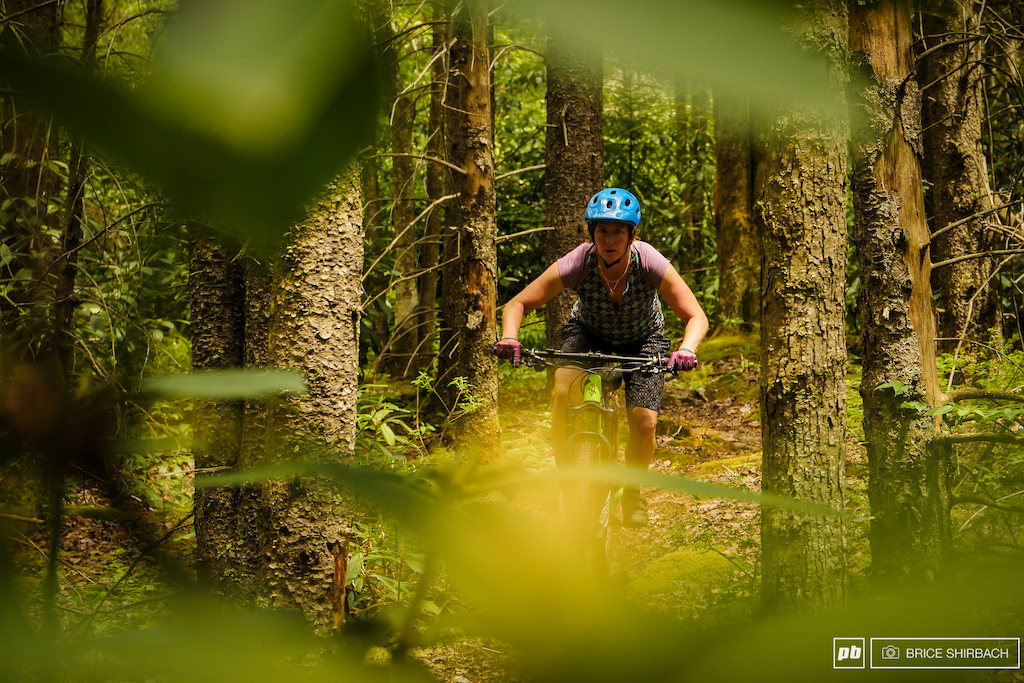
Sue's technical skills have been a strength from almost the beginning for her, something she admits comes from cutting her teeth in wild and wonderful West Virginia.
 How did you get into coaching? How has your approach to helping other people become stronger riders evolved over time?
How did you get into coaching? How has your approach to helping other people become stronger riders evolved over time?I did some fitness coaching for a while, and saw success with some of my clients. I eventually switched to skills coaching, partly because there are so many fitness coaches out there who can do their job better than I could. Teaching women mountain bike skills is really a joy for me. I love to see women be able to get more comfortable on the trails, and get the confidence that comes with clearing a rock garden, or hitting a drop for the first time. I have travelled a lot, and I just want to help people to not have to struggle so much. Some coaches will say that mountain bike skills are just like life skills. I don’t necessarily look at it that way. The bike is easy. Life is hard. You don’t have to be in your head so much on your bike. The more skills that you have, the more fun you’re going to have. Those skills take practice, and it takes a while to gain skills. That’s the cool thing about the coaching; someone can take a clinic with me in a group format, then they can take a private lesson, and I can actually go out and ride on the trails with them. It’s an ongoing process that I love. It’s not a one and done thing. Now I know so many of these women from instructing them over the years, and that’s because I see them out riding. They’ll come to another clinic, they’ll take a lesson, they’ll jump in on a tour, or I just see them around the trails. It goes back to that enjoyment of spending time riding bikes with your friends, and my clients are my friends. It’s just a really fun job to do.
These women’s clinics build community among the women. Yeah, they’re taking a lesson to learn to ride better, but they’re also connecting with all of these other women. That’s something that gives them strength, and it’s also fun for them to meet other women mountain bikers. It’s a very community-oriented thing. It’s a support structure for women, and it’s a lot of fun. That’s the thing that can get lost on the guys sometimes. I’ve done some mixed clinics, and really the all women clinics are just more fun. Everyone is so supportive of progress. I think that’s what makes women want to get out on the trails more, buy some bikes, clothes, helmets, and it ends up being a great thing for the bike industry as well. Women are basically carrying the torch for the friendly side of our sport right now. There are so many women ambassador programs, and they’re based on clinics and educating women about bike maintenance, and similar things.
 What does it mean for you to call Davis home?
What does it mean for you to call Davis home?I first came to Davis for the 24 Hours of Canaan back in ‘94. It was a really famous race back in the day. I was on a 5-person team, and I wasn’t good enough to ride at night. I was still a pretty new rider then, and there were tons of mud puddles and rocks, and other really good things. I definitely cut my teeth riding in Davis. It’s always been a small town, but it’s always had a mountain bike shop for as long as I’ve been visiting. That really shows you just how bike-centric that place is.
When I was going through all of that shit with the Olympics, Davis was my support. All of those people were really cheering for me. I felt the love from the town. I moved away to Harrisonburg (Virginia) for a little while, but moved back into town four years ago because it’s just home. It’s got a great vibe, and the people are really nice. There’s a good mix of long time locals, and a new group of transplants who just love the lifestyle. Work is always going to be challenging, because there are only 500 people who live there. It’s just a really beautiful place. I can walk out my door, walk my dog in the woods, go for a bike ride, go XC skiing in the winter, and it’s all right there. That’s the lifestyle I want; I want to be in the mountains, in the forest and on the river. I don’t want to have to drive to get to those things. That’s the sacrifice a lot of people make here in lieu of a better paying job in other places. I’ve never been really good at that anyway, so I’m ok with that.
 How much of your identity as a rider comes from your east coast roots?
How much of your identity as a rider comes from your east coast roots?I wear the east coast badge really proudly. There was always this east versus west thing back when I was racing (Laughs). Everyone from the east coast thought that these races at high altitude ski resorts were super lame, and we always wanted to take things to the east coast. We were used to the roots, and rocks, and tough riding. I definitely think it’s just harder here. It’s pickier and more slippery. There’s so much technical terrain that’s easily accessible. Of course, you can find that stuff up in the big mountains out west, but the natural lay of the land here is just really challenging. You have to bring skills to the table, and that was something I was always really proud of. The racing scene is so strong here as well. There are so many different promoters doing stuff, you could spend a lifetime racing on the east coast.
Now, with the boom in trail building, the trails are getting better, and there are more of them. There’s more variety, and better draining trails here. I think that’s the thing that people from the west get worried about, is coming east and dealing with the rain. It rains a lot up and down the east coast. That’s what makes it so lush and beautiful. We’ve accepted life in the green room. I get so stoked riding among twenty shades of green. It’s a bit of a zen thing for me. I’m proud to be from east coast. There really haven’t been that many pro women (World Cup athletes) coming out of the east, so I am proud to be one of them.
 What’s ahead for you?
What’s ahead for you?Oh gosh (laughing), I have to commit to a dream for the future? I don’t know to be honest. I just want to keep fading out of races. I still do a few bigger races every year. I did the Whiskey 50 and a few stage races this year. I’ll do the Tour de Burg. I don’t know how much more I care to do. I really like what we have going on in Davis with the mountain bike festival, and the youth rides we host. Those things are fun, and really a nice way to be a part of something with a great energy.
One of my personal goals is to do "The Ring", a 62 mile loop in Fort Valley (Virginia) that is just all rocks. I’ve done it as a two-day in the past, and I’d like to try and get it done in one day. It’s about 14 hours of just riding rocks. That’s definitely one of my personal goals over the next year or so. I need to get the timing right, and be fit enough to not have to hike your bike the whole time. I really just want to keep riding tough stuff with my friends. That’s the goal, to keep riding bikes with friends.
MENTIONS: @briceshirbach
Author Info:
Must Read This Week
Sign Up for the Pinkbike Newsletter - All the Biggest, Most Interesting Stories in your Inbox
PB Newsletter Signup
-
About Us
Contacts FAQ Terms of Use Privacy Policy Sign Up! Sitemap -
Advertise
Advertising -
Cool Features
Submit a Story Product Photos Videos Privacy Request -
RSS
Pinkbike RSS Pinkbike Twitter Pinkbike Facebook Pinkbike Youtube Pinkbike Instagram
Newsletter Signup
Copyright © 2000 - 2024. Pinkbike.com. All rights reserved.
dv42 0.037314
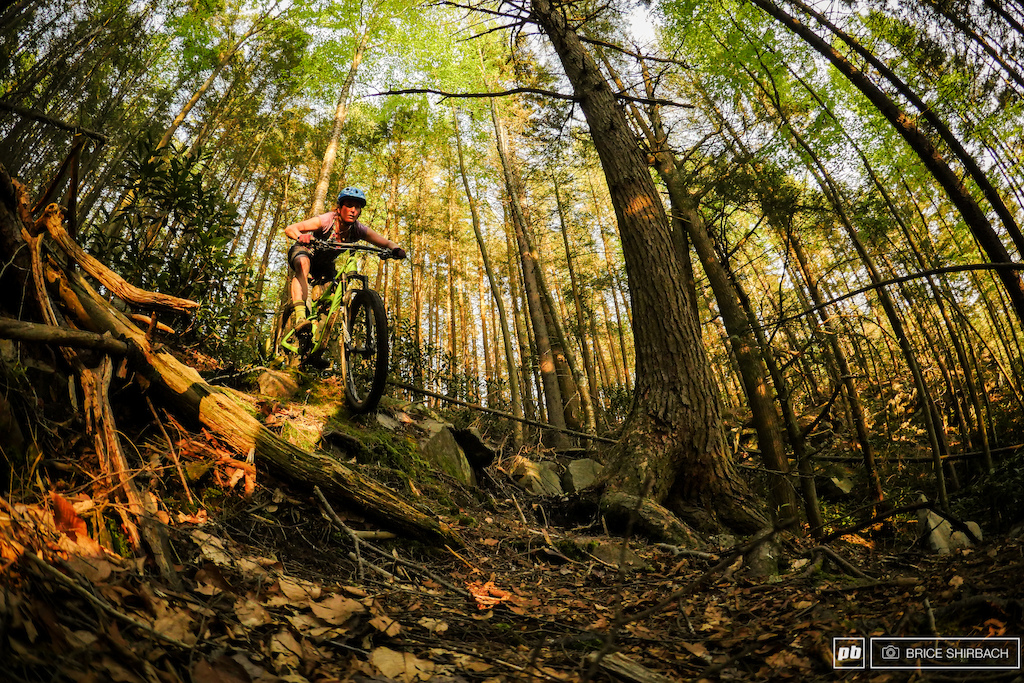
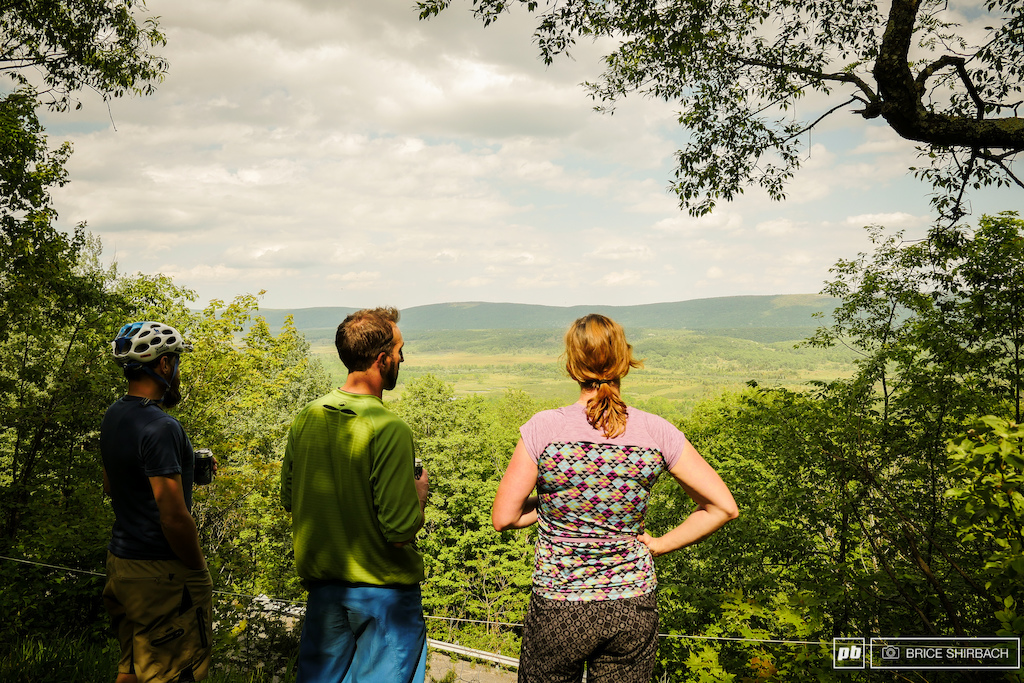
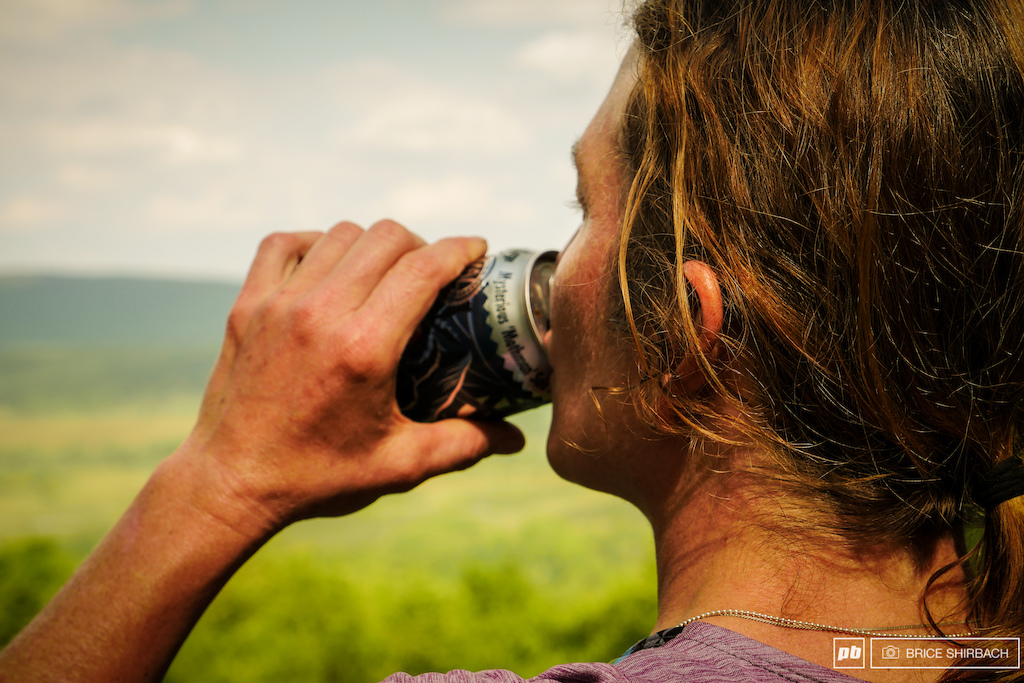
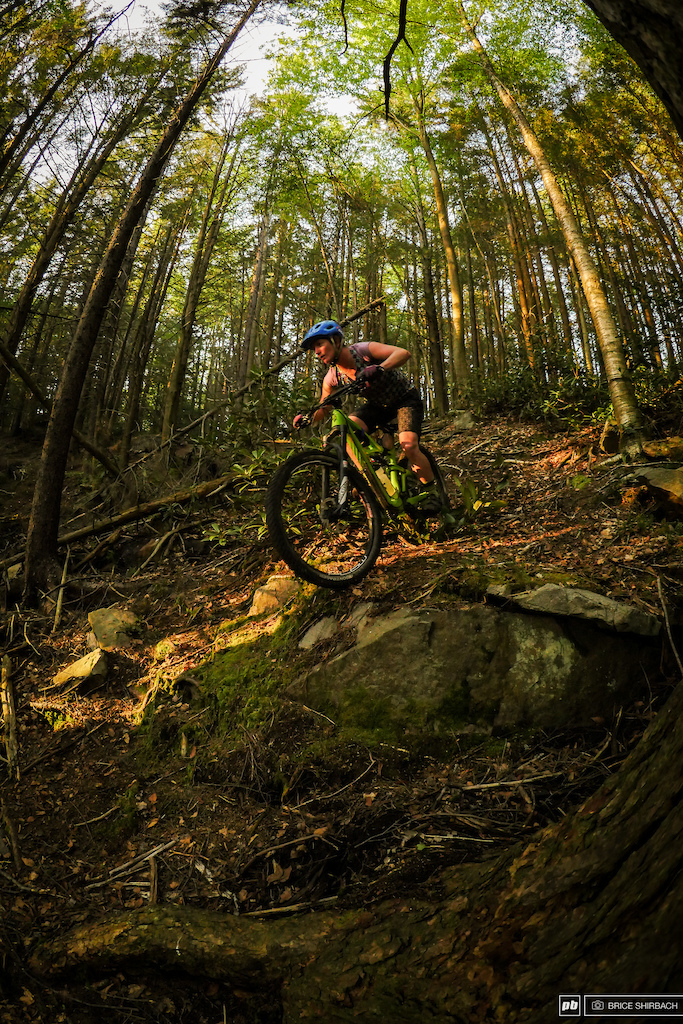
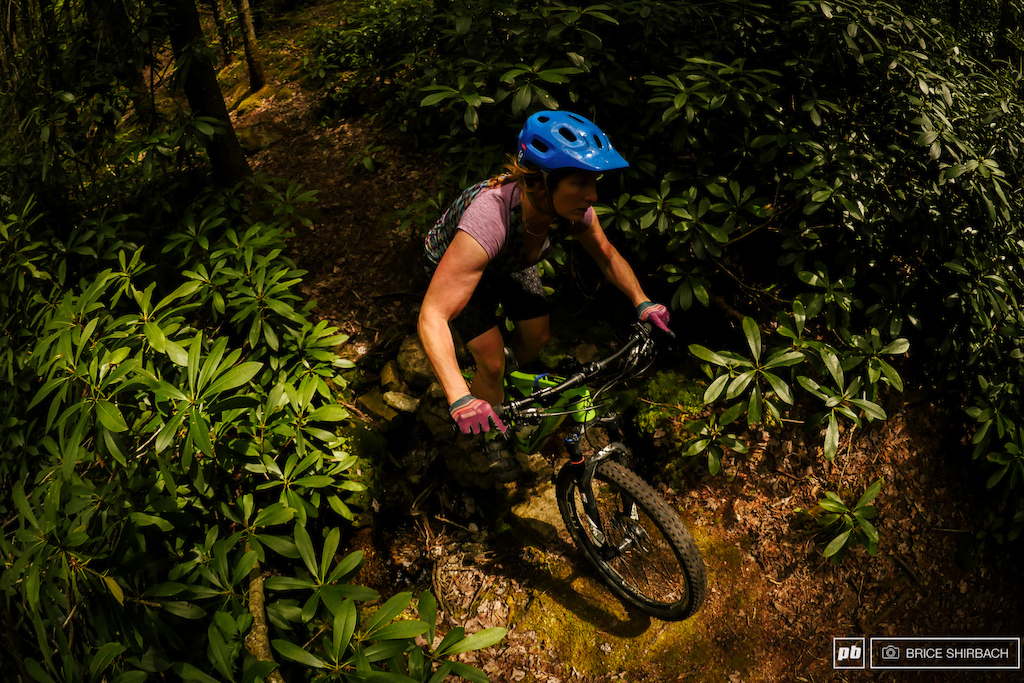
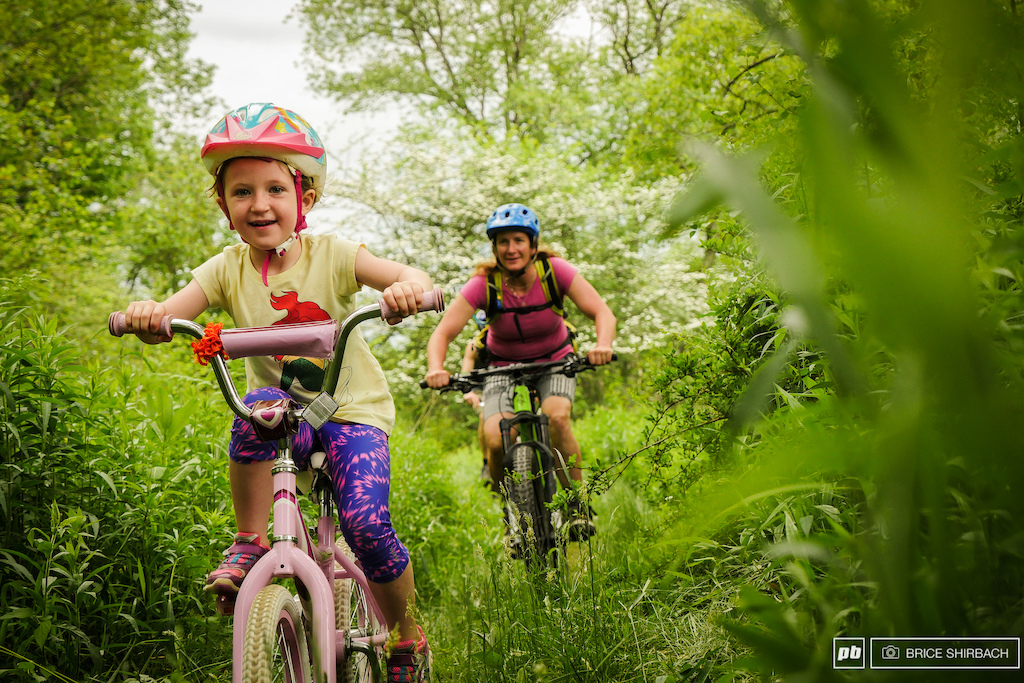
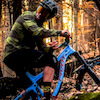
 Member since Dec 5, 2013
Member since Dec 5, 2013
The story of my MTB life.
Doing Ring Of Fire with a pre-set up camp around Camp Roosevelt is something I have mulled over before. Perhaps next summer.
Class act.
Sue is a great person and really inspirational to so many riders. Having seen her coach clinics the ladies she works with (and guys) always rave about her and her passion. Awesome inspiration, thanks for running this article.
I crossed paths with Sue many times over the years, but never really introduced myself. Another fond memory was years later from the Gnarly North Fork mountain bike race, when Sue passed me at the top of the last climb. I also wore the east coast technical skill badge quite proudly, and i wanted to know what she was all about, so I followed her down the top 1/4 of the decent. Let me just say... the skills are real!
Just thought I would share a personal story that just so happened to get me hooked on knobby bikes for life. So cool that she is still helping the local mtb community! One day I hope to return to the area and do the same.
Christ on a crutch - are Septics REALLY so far up their own arses that they think they're the only country with an East coast?
Join Pinkbike Login